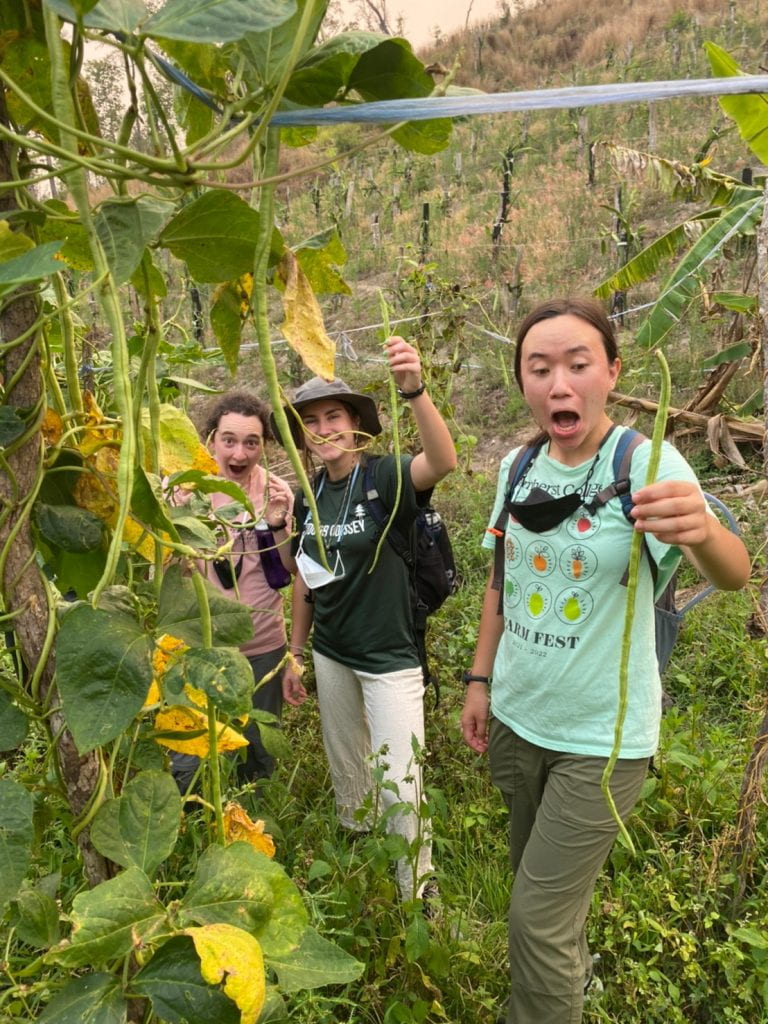Highlights & Key Takeaways: Reflecting on My Time in Thailand
Hello! As I find myself writing this, it is the very middle of the summer. Since I returned from Thailand, I have started a new internship in New Haven, a city that I have never lived in before. Thailand seems like worlds ago.
When I reflect back to my time in Thailand, I think of so many wonderful experiences. Some of my favorites were interactions I had with my host families. I also think fondly of having to learn a new language and practice it every day. And of course, I miss my instructors and classmates so much. Overall, I am thankful that I had the opportunity to spend quality time in another country where I can learn about different ways of living, different attitudes and customs, be a part of an experiential learning program. In some ways, I feel like it is still too early to really realize how studying abroad has affected me, but all I know is when I look at pictures of myself during the first few weeks abroad, I look different and younger than the person at the end of the semester.
Can’t you tell?


Leaving the United States in January, and arriving back in May (a bit teary eyed)
Some highlights and key takeaways:
Most unique experience: When studying oceans in the south, part of our 4th and final course, we stayed in a fishing village. My roommate and I walked to our host-home for lunch one day to find a bowl of something fried on the table that our host mother had cooked. After taking a bite, I felt like I had chewed into a fine sheet of tiny bones, almost like a flexible wavy Lays chip. My roommate and I could not figure out what type of meat it was, but it was delicious! Then, when our host mom walked into the kitchen, we asked her. She told us, in Thai, but we did not recognize the animal, so she pulled up a picture on her phone of a stingray. How amazing! We had just eaten the unsellable bycatch of her husband’s recent fishing trip.
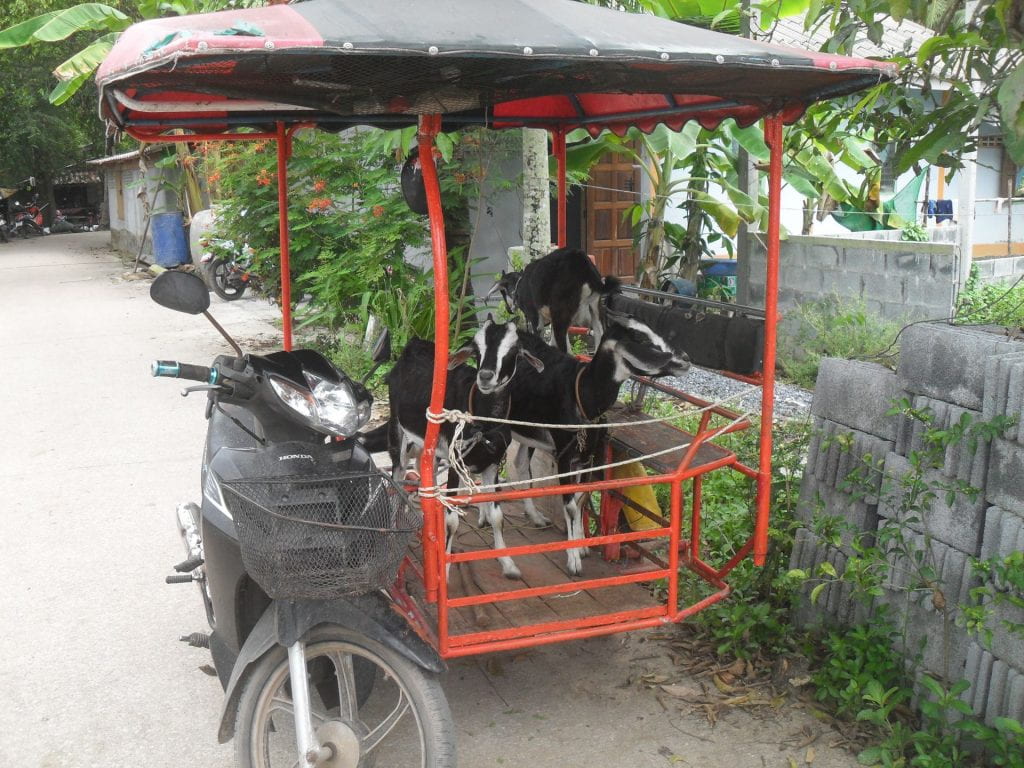
Moment where I felt most proud: We were all very nervous as we walked into the classroom. It was more than halfway through our semester, and we were about to take our Thai reading test. From my experience, learning how to read Thai is quite different from learning to read English or Chinese. It’s like a fun puzzle. Each word consists of letters which are read from left to right but spoken in a different order. Some letters rest on top of others and some underneath, too. When I was able to piece together words, understand sentences, and then finally answer questions based off of a paragraph narrative, after coming to Thailand not knowing a single letter, I felt so excited about my progress.
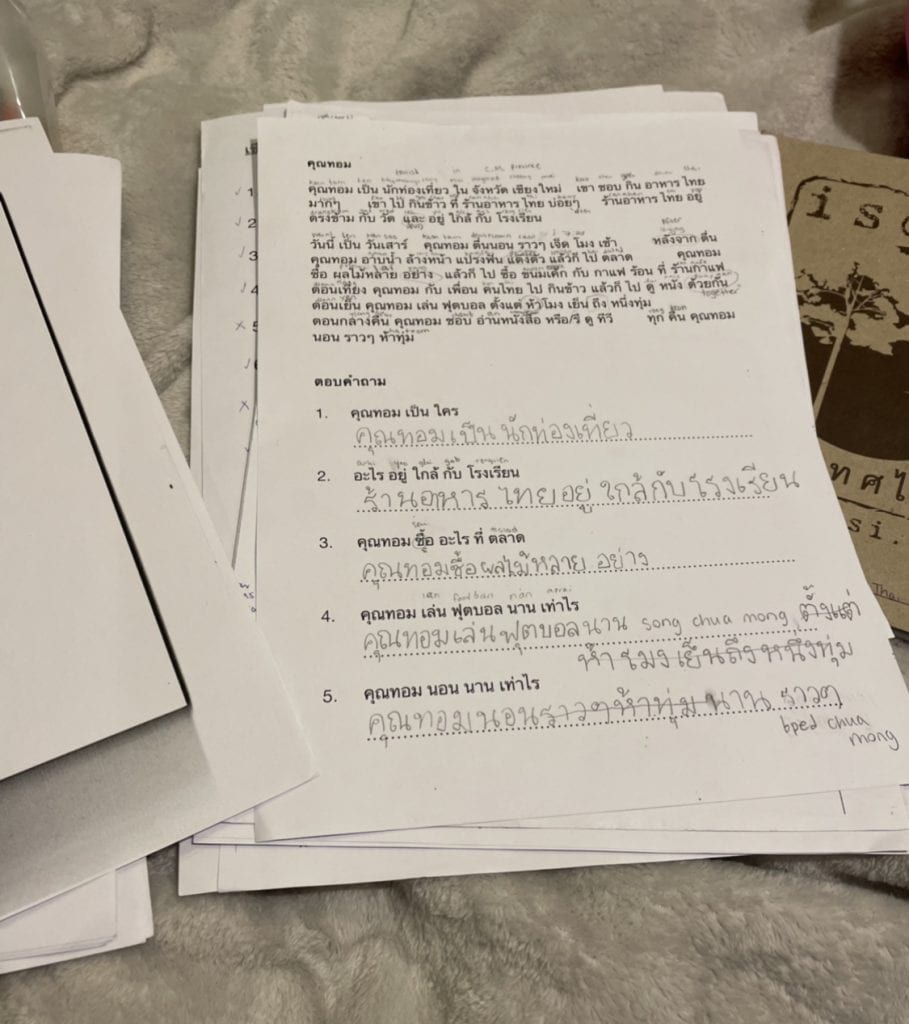
A runner up “moment” would be the time when my cohort learned about how governmental policy impacts which fishing gear people can register on their boats at sea. Our host teachers said that, despite governments only letting fishers register one type of gear, many fishers historically used many different types of gear during the day vs. night or during different seasons to diversify their catch. That night we went on a boat and went night squid fishing. Even though I was seasick, I was so fascinated by the process of it. We all waited, leaning over the boat with our individual lines, and then someone would catch a squid and pull them up. The little squid would squirm, spitting water, and we ate the squid sashimi right away, the colors in their flesh still changing even after being served. While I did not catch any squid, most of my cohort did, and we felt very accomplished as we were out there for many hours.

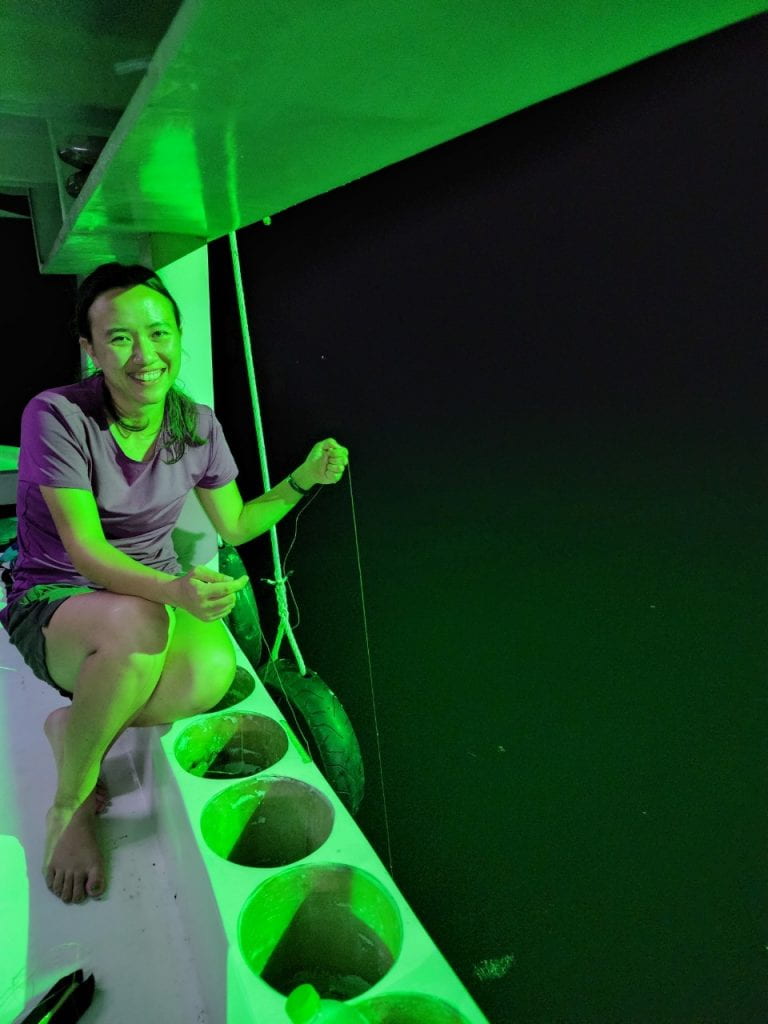
Squid fishing: The green light attracts the phytoplankton which attracts the squid. Our squid makes a showing in the next day’s meal.
Moment where I felt least accomplished (but it was funny!): Being in a country where I am still learning the language yet having to communicate basic needs with host families brings many funny language mishaps. My favorite mishap happened early on with my host family in the agricultural village. My classmate and I were interviewing my 21-year old host brother and his fiance about our host family, part of a simple homework assignment. After learning that this family was quite large, I decided to go out on a limb and ask, in Thai, if he could draw his family tree for me. He agreed, took the paper, and began writing. I was so proud that I had gotten my request across. However, when he started to write words such as tamarind, jackfruit, and guava, I realized that something had gone very wrong. Then it hit me: he thought I had requested a list of all the trees on his family’s property! My classmate and I suppressed our embarrassment and took the finished list with gratitude. Since we were there to learn about agriculture, hopefully they did not think anything strange of it.
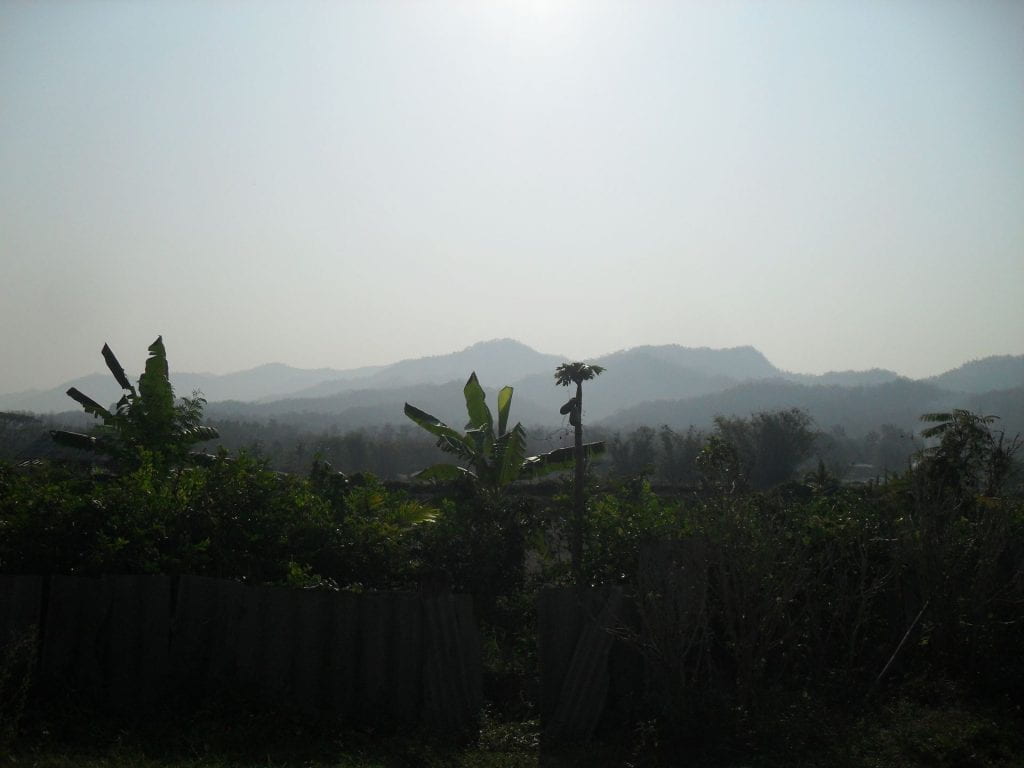
Best independent travel day: When classes finished, I gave myself 2 days to explore the Bangkok area with two friends before taking the long flight home. We decided to take the train to visit Ayutthaya, a city outside of Bangkok. This city is home to a UNESCO World Heritage site, the ruins of what was once the capital of the Kingdom of Siam from 1350 CE until the Burmese invasion in 1767 CE. It was so hot this day, but after spending a semester in Thailand during the hottest time of the year, we knew how to stay cool with cold water and and frequent trips to sit in front of fans. Close runner ups would be the hikes I went on with friends (the Chiang Mai area has a bunch!) over the weekends. One time my friend and I got lost in forest trails behind a temple and a Monk led us back into the temple grounds through the back door.
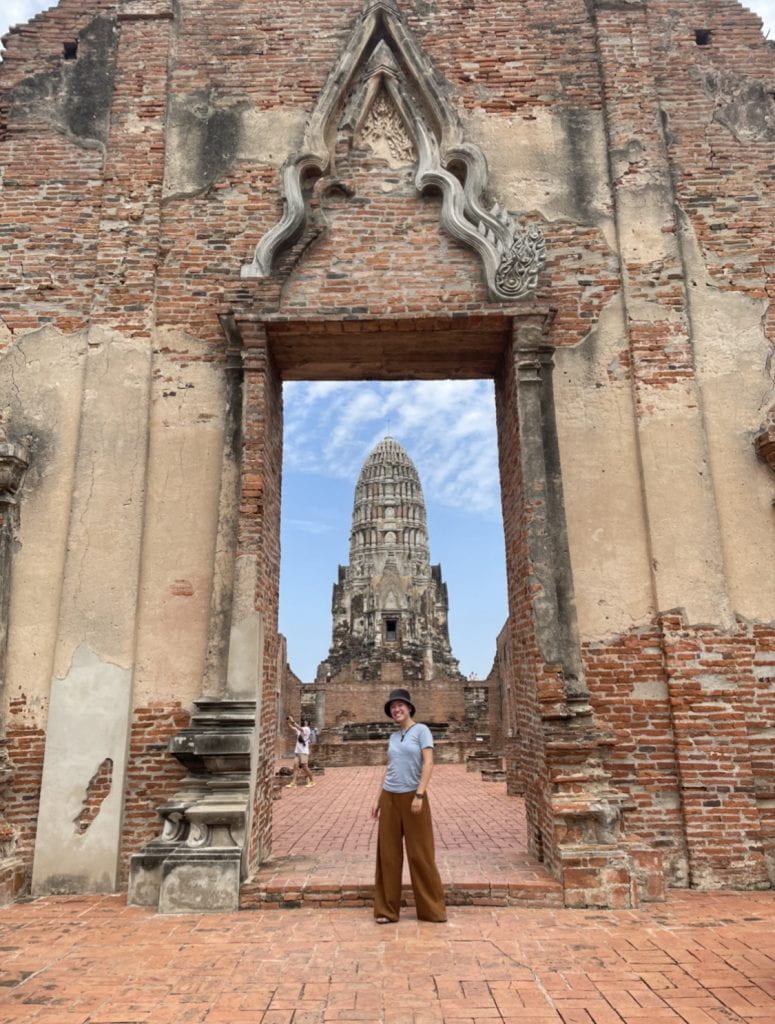
Biggest academic takeaway: My three environmental courses had strong agricultural themes, despite only the first course being explicitly about agriculture. After the semester ended, I had learned about polyculture, sustainable agriculture, rotational farming, local ecological knowledge, aquaculture, and fishing livelihoods. When it comes to producing food, small-size villages that practice sustainable agriculture place a strong importance on intergenerationality. They practice what they learned from older generations and are motivated to create a good life for their children. We learned so much about sustainable agriculture even when studying forest or ocean conservation because my program chose to have us learn from those who live on that land. In contrast to, say a national park or governmental organization, those who live on the land over many years need to not only grow/collect food on that land, but need to find ways to do so that will last over many generations.
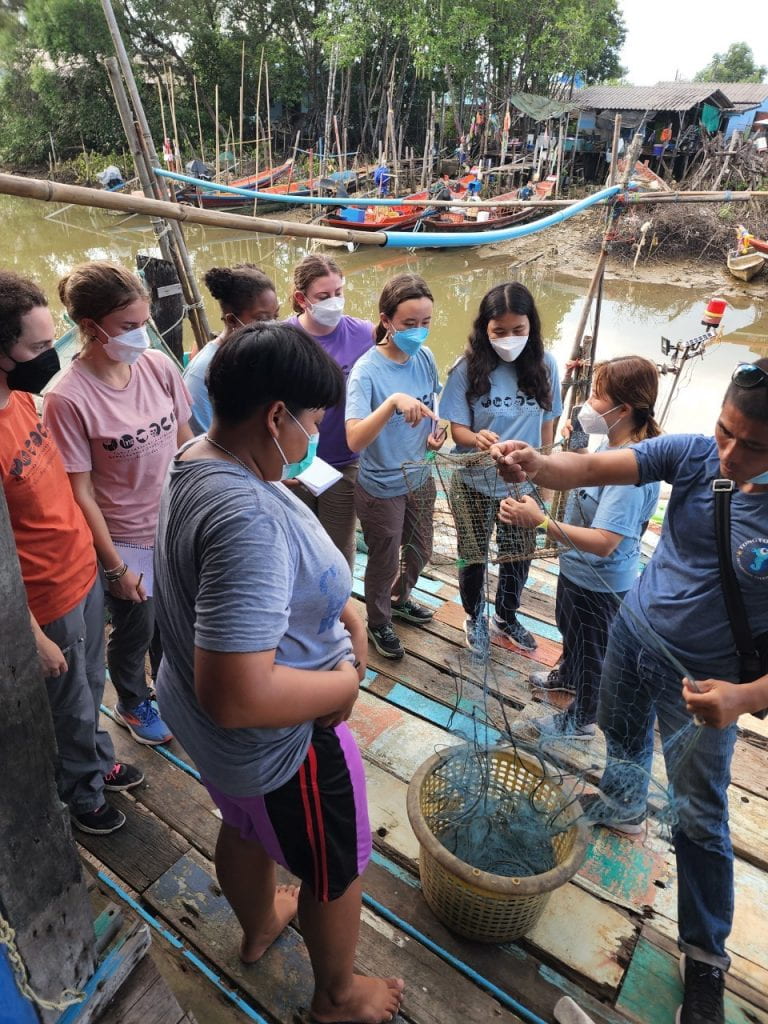
Biggest shock: While living in Thailand, I was surprised by many new cultural phenomena: standing to honor the King in the movie theater, wearing my mask outside, bowing hello to elders (to “wai” in Thai), and putting my toilet paper in the trashcan instead of flushing it (I really do miss those Southeast Asian “bum guns”). However, the shock that stuck with me throughout the entire semester were the affordable prices. I distinctly remember, on our first day in Thailand, when our instructors brought us to a mall to buy things for our rooms. We walked into a store and stared, ecstatic, at the prices, doing the math in our heads to U.S. dollars. That week, we bought our dinners from an outdoor market, with made-to-order classic Thai meals only costing $1.50. It was shocking, exciting, and slightly discomforting. I do wish that my program had reminded us why the American dollar has become so much stronger and addressed what it means to have so much purchasing power as an American visitor.
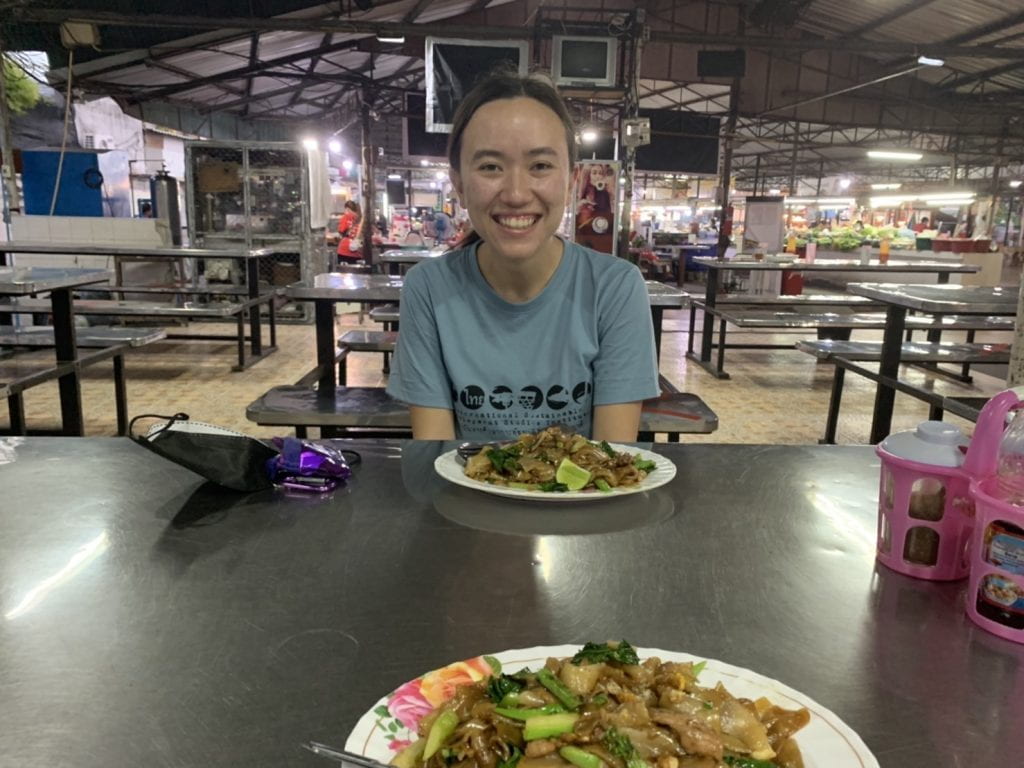
Biggest Personal Growth: Definitely increased stamina. At Amherst, I was fully aware of what it meant to feel burnt out. It came when I did not get enough sleep, stressed too much about assignments, or had too much on my plate. In Thailand, I did not feel burnout. Instead, I experienced cycles of physical and academic exhaustion as we went on our three 3-week excursions. But these were satisfying. At the end of a soul-filling excursion away from our main campus, with a hiking backpack full of stinky damp clothes and an overwhelming desire to shower, my classmates and I would always rush off to our apartment rooms yelling “you won’t see me until tomorrow!” “Have a good night everyone!” Granted, we had just spent a LOT of time around each other, interviewing leaders at site visits, navigating language barriers, and never being alone. However, I found that after a few nights of rejuvenation, I was ready to do it all over again. This was possible because life was simplified. We were not allowed to bring any technology on the trips, and while this was sometimes difficult, it made us focus only on the present moment. I found myself going to bed as early as 8pm, exhausted and without a phone to keep me up. Going to bed early meant waking up early, so I developed better sleep habits. I learned how to make the best use out of precious downtime, not get worked up by uncomfortable situations, and prepare for hot weather. Overall, I have a much better idea of my own stamina and abilities.
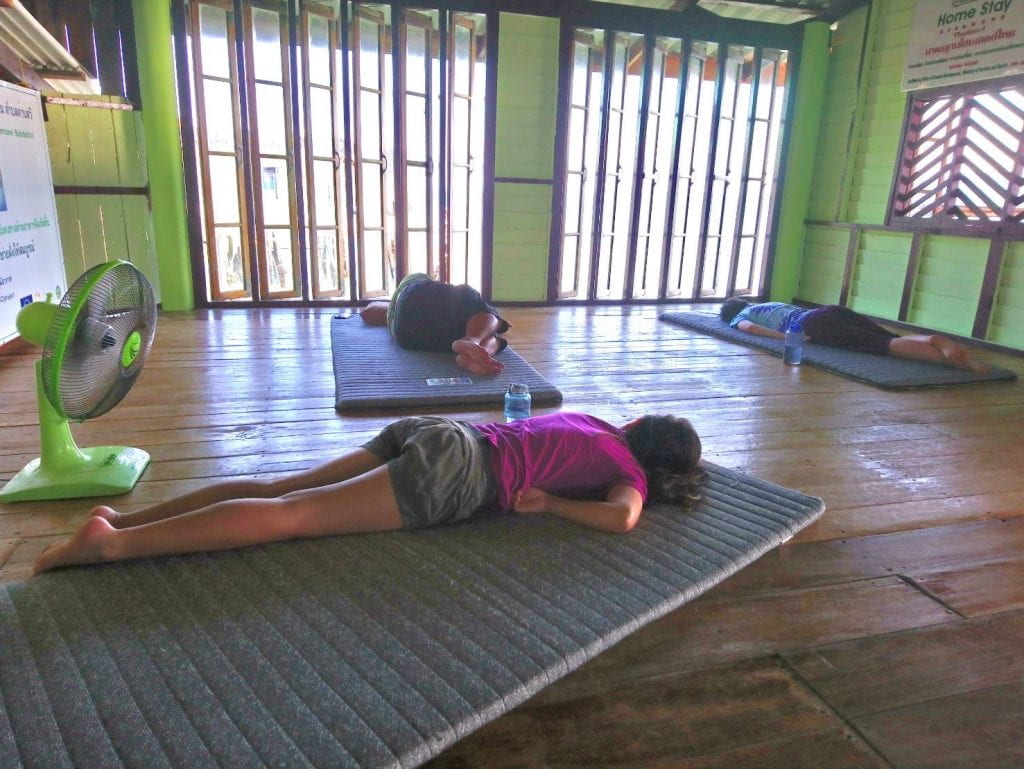
This concludes my blog series. I hope that you learned a bit about what it is like to study abroad, especially with an experiential learning environmental studies program. If you are considering going abroad, I would suggest thinking about what you hope to gain from the experience in addition to being awed by new and beautiful sites. Are you ready to be challenged by language barriers? Is this a new step for you as you seek to become a more independent person? How will you develop the stamina to keep asking questions, being inquisitive and jumping into uncomfortable situations? And if you are considering an experiential learning program, I am so excited for you. For me, it was the perfect opportunity to rejuvenate my fascination with learning and connect with others outside of the mainstream classroom. Best of luck with your journey! โชคดี!
